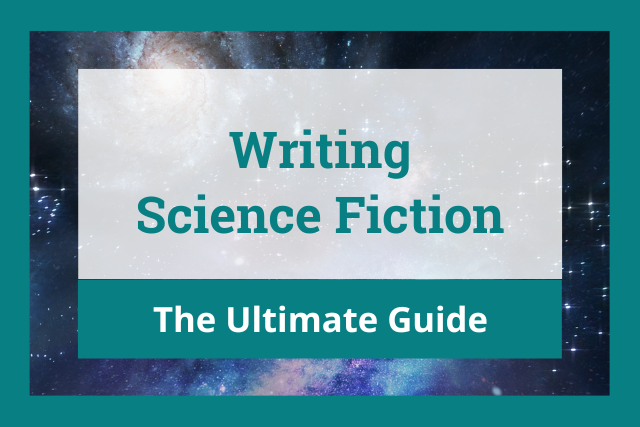
Writing science fiction can feel a lot like exploring the expanse of the universe. It’s a big undertaking in a big genre.
It’s hard to boil down exactly what science fiction is. In fact, the definition of sci-fi is hotly debated among experts and genre enthusiasts. Is it the campy creature features of early cinema or the esoteric, philosophical stories of classic literature?
One thing is certain: science fiction involves scientific elements or principles that are central to the plot of the story.
Whether you’re writing hard science fiction, pulp sci-fi, or something in between, we have everything you need to know to begin writing a great science fiction story.
7 Steps for How to Write a Sci-Fi Novel
Writing science fiction doesn’t need to feel overwhelming. If you want to write science fiction but don’t know where to start, try these seven steps for how to write a good science fiction story.
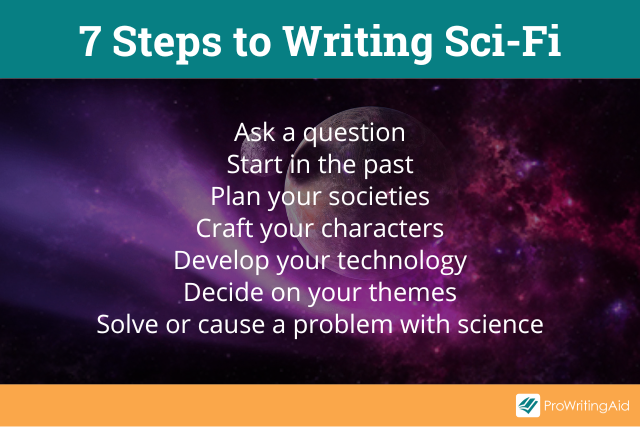
Ask a Question
Every great story starts with a question, and that’s especially true of science fiction. Science fiction novels usually ask some big “what if” question. In fact, it’s this question that drives the entire genre.
Science fiction stories have an element of novum. Science fiction scholar Darko Suvin coined the term “novum,” which is Latin for “new thing,” as a defining element of science fiction.
In essence, novum is a new, fictional idea that is grounded in or reconcilable with reality. It’s the difference between sci-fi and fantasy, and it’s crucial that you find the novum within your story.
Writing Youtube Channel Tale Foundry gives the example of vampires. Vampires as a mythological creature are fantasy.
But what if a virus causes people to need to suck blood to survive? Viruses are real science, so they’re grounded in reality. This is novum.
Ask a big question and answer it with novum. This will give you the most important foundations for your plot.
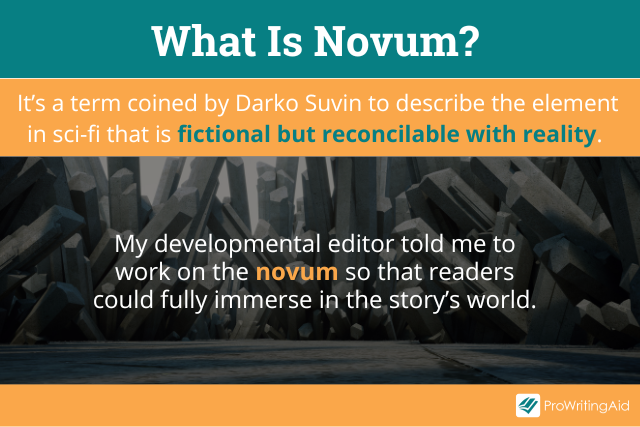
Decide on Your Themes
Every great science fiction novel explores heavy themes. Many touch on race, gender, and class.
Some explore what it means to be human or the indomitable human spirit. Dangers of technology, surveillance, and fascism are other major themes. The possibilities are endless.
Once you have a big question and your science element, ask yourself what themes make sense to explore. A compelling sci-fi story will often tackle a few major themes.
Find themes that work well together.
For example, the themes us vs them and exploration can make for a great space odyssey book full of aliens. Androids and robots are a fun way to tie together what it means to be human with the dangers of technology.
Start in the Past
By this point, you probably have a world and plot forming. But another important part of world building is creating the history or backstory.
Whether your world is about to encounter aliens, or it’s an advanced space-faring civilization, or a virus wiped out most of Earth’s inhabitants, you need to start in the past.
How did your world get to the point it’s at when your science fiction novel begins?
Working backward is the best way to explore this. What did the world look like a year or five years before? A decade before? A century? You’re essentially looking for the causes after knowing the effects.
This information is crucial for establishing a well-developed science fiction world within your story. As you explore this, you may also uncover new themes or plot points to explore.
Plan Your Societies
Now you have the foundation for the world you’ve built, you can start planning the details of your novel’s societies and social structures. The more detail you plan in advance, the easier constructing the plot will become.
Be sure that you keep science and your novum in the forefront as you develop societies for your science fiction book.
Some books are science fiction–adjacent. Perhaps they take place in a dystopian or apocalyptic Earth or a futuristic society in space. But if science is not a guiding force in the world and the story, it is not true science fiction.
Develop Your Technology
For some science fiction writers, developing sci-fi technology is the most enjoyable part of the process. It’s time to turn on your geek mode and create an exciting new reality for your story.
Here are some questions to consider as you develop your science fiction tech:
- Does this technology help or hurt people?
- Who in society has access to the technology?
- How was the tech created? Why?
- How is the tech powered?
- What are the dangers associated with the technology?
- What current, real-world examples are related to the tech?
- How does this technology serve the story themes?
As you answer these questions and others, you may find new plot conflicts or storylines to explore. Let your imagination run wild.
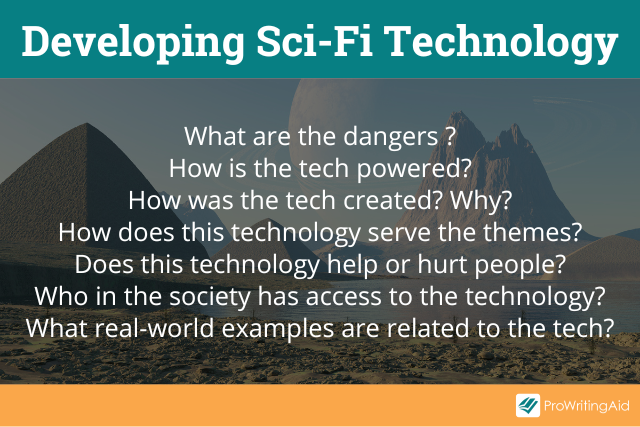
Craft Your Characters
There’s a good chance you have an idea of your protagonist by this point in the writing process. But now that you have an amazing science fiction world built, it’s time to fill it with the rest of your characters.
When you create your protagonists and antagonists, keep your story’s themes in mind. How will their character developments, traits, and flaws help you explore the themes?
Characters are often symbols for themes as well. This is true for both main characters and background characters.
Every character should have goals and motivations that make sense within the framework of the world you’ve built. They should also have relatable flaws that often cause conflict within the story.
Solve (or Cause) a Problem with Science
Your character has a problem. They need to reach their goal and something is in their way. This is where the major conflicts of your science fiction novel lie.
Your plot is how your main characters move toward their goal. When you’re writing a science fiction story, how your characters fail and succeed depends on science.
They may solve problems with a science element. Or the science in your story may be causing their problem or hindering them from achieving their goal. Science can be both, too!
By the time you’ve figured out what role science plays in character development and story arc, you’re ready to write!
5 Tips for Writing Science Fiction
Now you know the steps to writing a science fiction story, you’re off to a great start. But there is always more to know!
We’ve gathered five tips for writing science fiction to help you turn your story idea into the next great sci-fi novel.
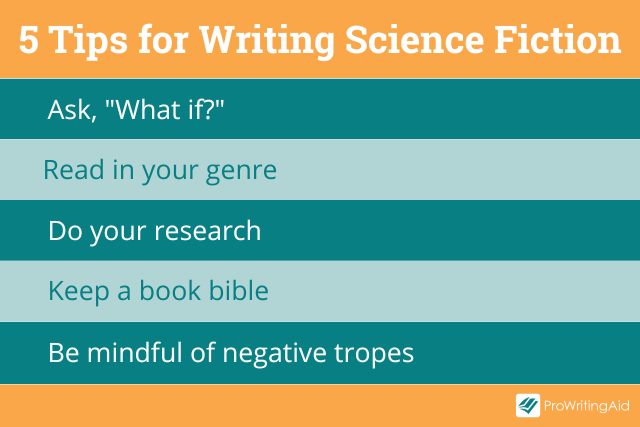
Be Mindful of Negative Tropes
Science fiction has a long history, and not all of it is positive. There are many harmful tropes in science fiction writing, and writers should all strive to avoid doing damage to marginalized people.
Racism is prevalent in both old science fiction and modern works. Many alien race storylines are rooted in racism.
It doesn’t matter if it’s green skin or three eyes: when any race with physical differences is written as more evil, uncivilized, or less intelligent than humans, it’s racist.
Likewise, depictions of oppression—whether aliens, androids, or robots—can also be damaging.
Sexism is also common. Breeder classes or aliens who implant eggs in humans without consent is an outdated and sexist trope.
Likewise, if all the military leaders or scientists are male, you’re alienating a large group of readers.
This is not an exhaustive list. Negative tropes also involve other marginalized communities. We always recommend hiring sensitivity readers to avoid accidentally offending your audience.
Do Your Research
Because science features so heavily in the plot of these stories, science fiction authors must become semi-experts in certain parts of science.
Science is an ever-evolving discipline. To understand how your sci-fi technology exists, you must understand what science currently says about that field.
If you’re writing about genetic engineering, you need a solid understanding of the field of genetics and what genetic engineering is presently capable of. If you’re writing about a virus, you will need to heavily research biology and virology.
Sci-fi readers are often science nerds, and they can tell when your science doesn’t feel plausible.
Keep a Book Bible
With all the research and world building you’ll need to do, it’s easy to lose track of details. This is especially true if you’re planning on writing a science fiction series.
When you’re creating new technologies, species, or classes, you need a reference.
A book bible is a living document full of the details of your world and your characters. You’ll keep track of research notes and backstory elements here. You can also keep character profiles in your book bible.
There are softwares like Campfire and World Anvil that will help you build a book bible.
You can also create a series of documents in a word processor. Note-taking apps and organizational apps can also be customized for book bibles. Find what system works for you.
Ask What If?
Story inspiration for science fiction writing lies in the “what if?”
What if there were genetically modified super-soldiers?
What if you fell into a parallel universe?
What if aliens are terrified of human beings?
Every “what if” question is a plot idea. It might turn into a whole novel, a plot detail, or a supporting storyline.
If you’re looking for inspiration, read about new science discoveries and ask questions. What if? What’s next? What dangers could come from this?
You can ask these questions as you’re world building, too. If you get stuck when creating a new planet or a new technology, start asking yourself what would happen if... ?
When you write science fiction, there’s no such thing as a stupid question. The best questions will lead you down a never-ending rabbit hole of ideas.
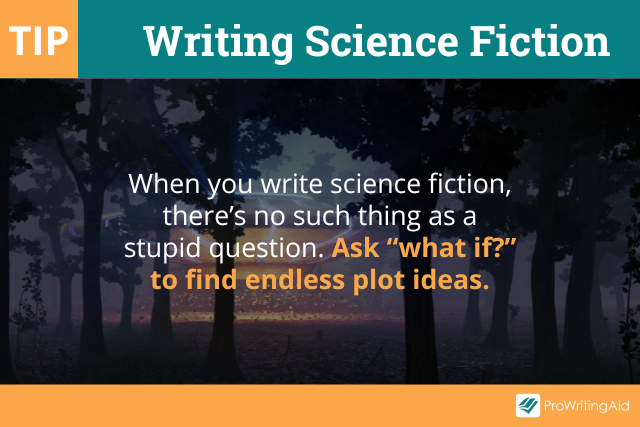
Read in Your Genre
Our last tip goes for sci-fi or any genre. The best way to learn how to write science fiction is to read science fiction.
Read hard and soft science fiction. Read classic and modern sci-fi. Pick up books from authors who come from a different background than you.
You should read stories within your subgenre, but you should also read in other subgenres. Science fiction has dozens of subgenres, from space odyssey to robots to weird sci-fi.
Reading in your genre will help you understand genre expectations, norms, and tropes. It will also let you know what is already out there so you can create a fresh, original idea.
How to Write a Science Fiction Story
Writing science fiction is a fun way to explore big ideas in a new world. Sci-fi remains a popular genre because readers are always looking for new realities to escape into.
Use these tips for writing science fiction to help you turn your novum into an incredible story. You can also use ProWritingAid to turn your sci-fi story into a masterpiece. Our Style Report will flag non-inclusive language, so you can avoid harmful stereotypes in your characters. Learn more about our inclusive language suggestions.
You can also use our Sensory Report to improve your sensory details. Premium users can compare their science fiction writing against the works of bestselling sci-fi authors like Madeleine L'Engle, Michael Crichton, and Arthur C. Clarke.

